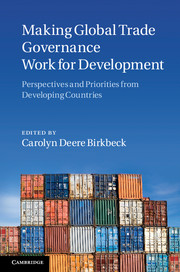 Making Global Trade Governance Work for Development
Making Global Trade Governance Work for Development from Part III - Strengthening multilateralism
Published online by Cambridge University Press: 07 September 2011
The World Trade Organization (WTO) as an institution is the subject of critique from diverse perspectives. Thus, on the issue of democracy, mainstream international relations thinkers such as Joseph Nye are concerned with the democracy deficit that characterizes the WTO as an advocate of cosmopolitan democracy (Esty 2002: 7–22; Nye et al. 2003: 437–73). States are as unhappy with the WTO as non-governmental organizations are in terms of both process and outcome. Even the corporate actor, often seen as the driving force behind WTO agreements, is not fully satisfied with the architecture of the WTO for, inter alia, it is denied direct access to WTO fora, in particular its dispute settlement system. A principal reason why nearly every actor is unhappy with the WTO is that it covers so much ground, and has put in place such a complex and legalized institutional structure, that it cannot but leave all actors dissatisfied in one way or another.
With every actor unhappy, it would appear that the WTO is the work of a transcendental force. Far from it – the creation of the WTO, its rules and organization, is the work of powerful social forces and States. It has emerged as a key institution to sustain the global capitalist order to the advantage of an emerging transnational capitalist class (TCC) whose interests are articulated by powerful States. To put it differently, the fact that all actors have grievances does not mean that all grievances are of equal weight and concern. It is therefore necessary to sift the grievances in terms of both process and outcome to determine the global population that is seriously hurt by the operation of the WTO and what can be done in terms of reform of the WTO rules, identifying the assistance needed from the international community, and outlining the role national parliaments and social movements must play to realize set goals. Such an exercise in social audit would allow the prioritization of reforms that should visit the WTO.
To save this book to your Kindle, first ensure no-reply@cambridge.org is added to your Approved Personal Document E-mail List under your Personal Document Settings on the Manage Your Content and Devices page of your Amazon account. Then enter the ‘name’ part of your Kindle email address below. Find out more about saving to your Kindle.
Note you can select to save to either the @free.kindle.com or @kindle.com variations. ‘@free.kindle.com’ emails are free but can only be saved to your device when it is connected to wi-fi. ‘@kindle.com’ emails can be delivered even when you are not connected to wi-fi, but note that service fees apply.
Find out more about the Kindle Personal Document Service.
To save content items to your account, please confirm that you agree to abide by our usage policies. If this is the first time you use this feature, you will be asked to authorise Cambridge Core to connect with your account. Find out more about saving content to Dropbox.
To save content items to your account, please confirm that you agree to abide by our usage policies. If this is the first time you use this feature, you will be asked to authorise Cambridge Core to connect with your account. Find out more about saving content to Google Drive.